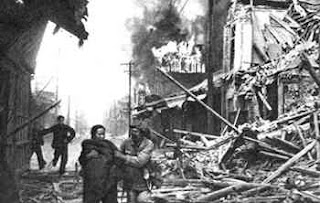General Chaffee reached Taku at dawn on 29th July and immediately pushed on to Tientsin, arriving just before noon on the 30th. Within hours, he had called on the various generals commanding the troops of the eight nations to assess the alliance’s overall readiness and capability; and arranged a full conference of generals for 31st July. The press outnumbered the generals by a ratio of some ten-to-one at this conference, which was introduced as having the single purpose of deciding whether the alliance was ready to make a movement for the relief of Peking.
It was disclosed in the conference that the Japanese, whose forces occupied the right bank of the river in and about Tientsin, where the British and American forces were also located, had been able to determine that the Chinese were in considerable force in the vicinity of Pei-tsang, about seven miles distance up the river from Tientsin, and that they were strengthening their position by earthworks extending from the right bank of the river westward something like thee miles, and from the left bank to the railroad embankment. The Chinese forces were variously estimated from between 10,000 to 12,000 men in the vicinity of Pei-tsang, with large bodies to the rearward as far as Yangtsun, where it was reported that their main line of defence would be encountered.
I believe that, irrespective of this intelligence, Chaffee’s mind was already set. Nevertheless, the first question that he submitted for decision was "whether a movement could be made at once". This was answered with dissent, based on doubt that the force we could put in movement was not sufficiently strong to meet the opposition that might be expected. To this, Chaffee replied that, in addition to the Italian and Austria-Hungarian naval contingents that could remain in defence of Taku and Tientsin, the alliance forces available numbered around 18,800 and that the US contingent of some 2,100 men of the 9th and 14th Infantry regiments, together with a division from the 6th Cavalry and a Marine battalion would be leaving for Peking on Sunday 4th August.
This statement, brazen and defiant in the face of General Gasalee's previous stance, triggered an approving cheer from the press benches; but this was nothing compared with the raucous roar that followed Chaffee's subsequent announcement that he would be accompanied by a further 3,000 British troops under the command of Admiral Seymour, who had already attempted an earlier relief expedition.
Explore your family history at Genes Reunited.co.ukIt was disclosed in the conference that the Japanese, whose forces occupied the right bank of the river in and about Tientsin, where the British and American forces were also located, had been able to determine that the Chinese were in considerable force in the vicinity of Pei-tsang, about seven miles distance up the river from Tientsin, and that they were strengthening their position by earthworks extending from the right bank of the river westward something like thee miles, and from the left bank to the railroad embankment. The Chinese forces were variously estimated from between 10,000 to 12,000 men in the vicinity of Pei-tsang, with large bodies to the rearward as far as Yangtsun, where it was reported that their main line of defence would be encountered.
I believe that, irrespective of this intelligence, Chaffee’s mind was already set. Nevertheless, the first question that he submitted for decision was "whether a movement could be made at once". This was answered with dissent, based on doubt that the force we could put in movement was not sufficiently strong to meet the opposition that might be expected. To this, Chaffee replied that, in addition to the Italian and Austria-Hungarian naval contingents that could remain in defence of Taku and Tientsin, the alliance forces available numbered around 18,800 and that the US contingent of some 2,100 men of the 9th and 14th Infantry regiments, together with a division from the 6th Cavalry and a Marine battalion would be leaving for Peking on Sunday 4th August.
This statement, brazen and defiant in the face of General Gasalee's previous stance, triggered an approving cheer from the press benches; but this was nothing compared with the raucous roar that followed Chaffee's subsequent announcement that he would be accompanied by a further 3,000 British troops under the command of Admiral Seymour, who had already attempted an earlier relief expedition.
























